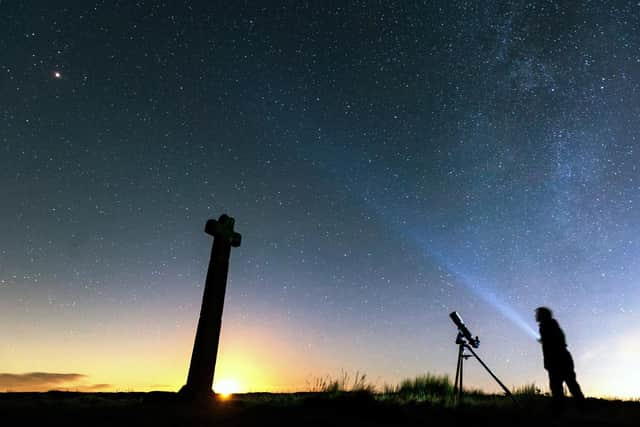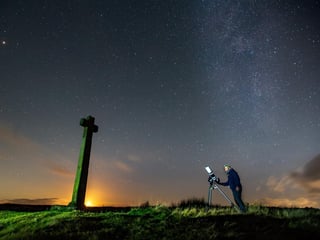How North Yorkshire’s two national parks named international dark sky reserves can boost region
Along the winding and aptly named Mars Hill Road, stands the Lowell Observatory perched above the city of Flagstaff, Arizona.
It found fame in 1930 after discovering the planet Pluto, but during the past two decades, Flagstaff has dramatically built on its reputation as a place to witness the wonders of the night sky.


Advertisement
Hide AdAdvertisement
Hide AdThe city was the first location in the world to be given official International Dark Sky Place designation by the International Dark-Sky Association in 2001, and has since capitalised on the economic and environmental benefits the award has brought.
It is hoped that these benefits will be mirrored some 5,000 miles across the Atlantic, after the Yorkshire Dales and North York Moors National Parks were this week designated as International Dark Sky Reserves by the association.
The announcement is the culmination of five years of work to secure the designations, and means both of the National Parks join an exclusive club.
Other sites that have protected status include the Grand Canyon and Death Valley National Parks in America, Mont-Mégantic National Park in Canada and NamibRand Nature Reserve in Namibia.
Advertisement
Hide AdAdvertisement
Hide AdChris Luginbuhl, the chairman of the Flagstaff Dark Skies Coalition which was established in 1999, knows better than most the importance of the designation for the city.
He has lived in the Flagstaff for the past 45 years and retired from his role as an astronomer at another of the city’s three observatories in 2014.
Father-of-two Mr Luginbuhl, who lives with his wife Debra, said: “Flagstaff has had a long association with astronomy pretty much since the city was founded in 1881 and it has always been in its DNA.
“But the designation has instilled a pride that was not necessarily there before. It has inspired the community to take ownership and protect the night skies.”
Advertisement
Hide AdAdvertisement
Hide AdIt is hoped the already vital tourism industry in the Yorkshire Dales and the North York Moors will be given a welcome boost by their new designation as International Dark Skies Reserves.
Official figures have shown that the tourism industry in Flagstaff supports more than 8,000 jobs and is worth $500m to the local economy.
For Ruskin Hartley, the executive director of the International Dark-Sky Association (IDA), the designation for the Yorkshire Dales hold a particularly special place in his heart.
Mr Hartley, who is based in Tucson with the IDA, was born in Liverpool and his parents Derrick and Barbara live in Sedbergh in the Yorkshire Dales National Park.
Advertisement
Hide AdAdvertisement
Hide AdThere are currently 59 locations with dark skies designation in 22 countries, including 17 sites in the UK.
There have been 27 designations this year and 25 in 2019, showing the growing awareness of the importance of dark skies.
Mr Hartley, who has worked in conservation and planning for the past two decades, said: “The reserves which are designated, like the Yorkshire Dales and the North York Moors, are the ones we get particularly excited about.
“These are living landscapes, where people and wildlife have been residing for millennia, and while astronomy is an important aspect, it is just one reason for protecting the night skies.
Advertisement
Hide AdAdvertisement
Hide Ad“Light itself is such a complex issue, and can have such detrimental effects on the environment and people’s health if it affects their sleep patterns.
“A designation is not about taking anything away from people, it is about enriching their lives and introducing a better quality of light.”
A debate will be held in Parliament on Monday to discuss the Government’s policy on dark skies.
The All-Party Parliamentary Group for Dark Skies published a report on Wednesday, and called on the Government to set up a statutory Commission for Dark Skies and designate a new Minister for the Dark Sky.
Advertisement
Hide AdAdvertisement
Hide AdLord Martin Rees, the Astronomer Royal and the co-chairman of the group, told The Yorkshire Post: “It is wonderful news that the Yorkshire Dales and the North York Moors have been designated. But so much more needs to be done to ensure that people have the chance to see the night skies.”
The Geminid meteor shower
There’s an opportunity to see a celestial display of shooting stars tomorrow night, as the Earth passes through a meteor shower.
The Geminid meteor shower, which returns every December, is expected to peak some time during tomorrow night (13 December) and will be visible until the early morning of Monday.
An absent moon will ensure that the meteors, which are widely regarded as the most impressive of the year, stand out brightly as they streak across the sky, with as many as 70 an hour.
Advertisement
Hide AdAdvertisement
Hide AdThe Geminids originate from a rocky asteroid called 3200 Phaethon.
They were first observed in 1862.
________________
Support The Yorkshire Post and become a subscriber today.
Your subscription will help us to continue to bring quality news to the people of Yorkshire. In return, you'll see fewer ads on site, get free access to our app and receive exclusive members-only offers. Click here to subscribe.
